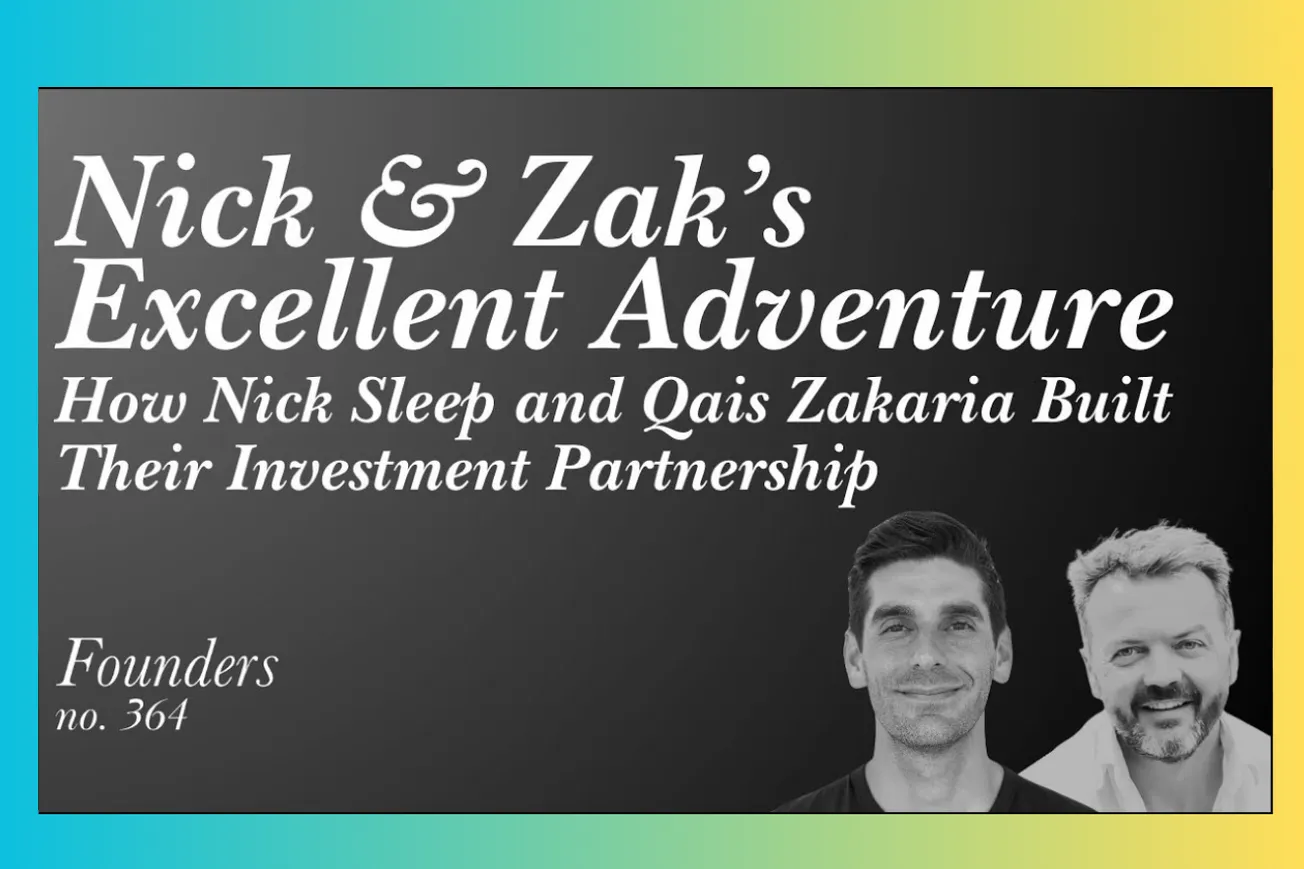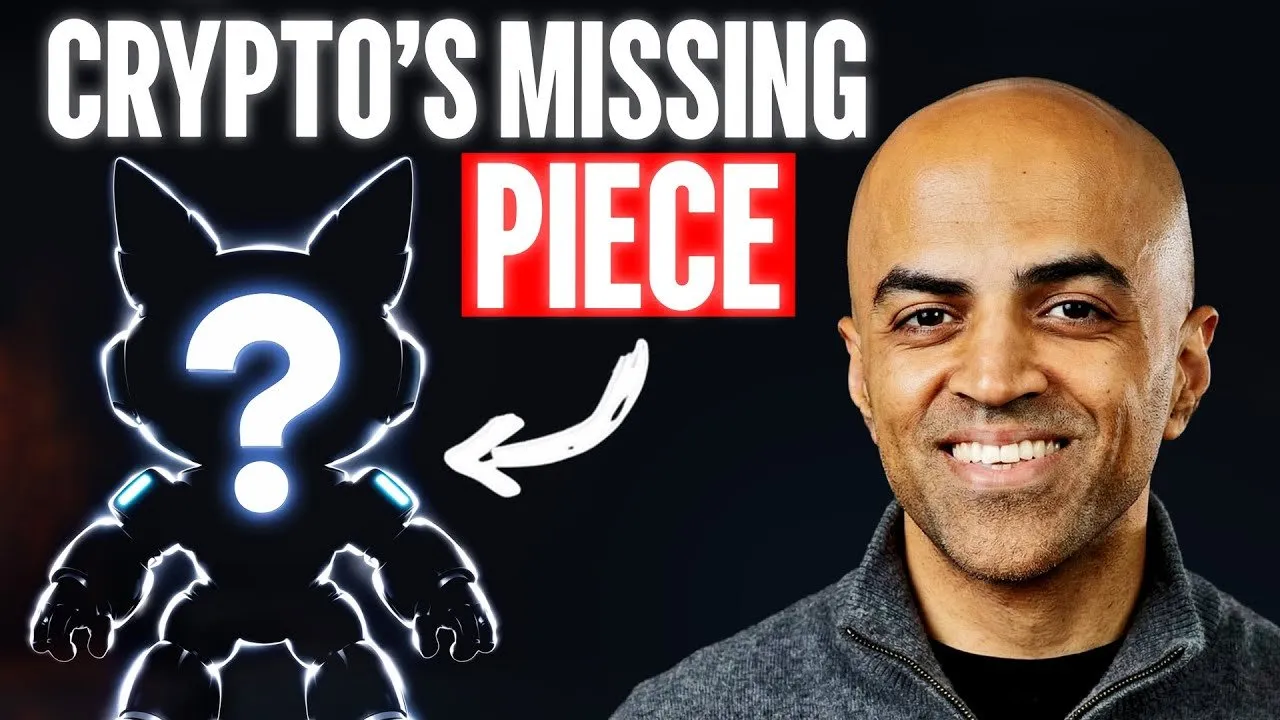Table of Contents
Nick Sleep and Qais Zakaria built their Nomad Investment Partnership around quality, long-term thinking, and deliberate disconnection from short-term market noise, achieving a 10x return over 14 years.
Key Takeaways
- Sleep and Zakaria viewed their fund as a "laboratory test for how to invest, think and behave in the most high-quality way" rather than just a money-making vehicle
- They practiced "intentional disconnection" from ephemeral information, focusing only on insights with long shelf lives instead of daily market noise
- Their investment philosophy centered on "destination analysis" - asking where businesses would be in 10-20 years and what actions today increased those odds
- They discovered "scale economies shared" as their earned secret - businesses that pass cost savings back to customers create virtuous cycles of growth
- The partnership deliberately ignored conventional wisdom, taking delight in turning away irritating investors regardless of their wealth
- Their concentration strategy included holding up to 70% of their portfolio in a single stock, with complete conviction in their research
- They closed the fund in 2014 after achieving their 10x goal, with Sleep investing almost all his wealth in just three stocks: Amazon, Costco, and Berkshire Hathaway
- Sleep's philosophy was shaped by "Zen and the Art of Motorcycle Maintenance," emphasizing that quality in work becomes a spiritual exercise
- Both partners were comfortable being outsiders from early ages, which enabled them to resist industry pressure and conventional thinking
Timeline Overview
- Early Foundations (1980s-1990s) — Sleep discovers investing through Edinburgh's fund management reputation; Zakaria's family flees Iraq, father loses fortune speculating in stocks he didn't understand
- Professional Development (1995-2000) — Sleep joins Marathon Asset Management under mentor Jeremy Hosking; Asian Financial Crisis brings Sleep and Zakaria together as unlikely allies
- Partnership Formation (2001-2002) — Nomad Investment Partnership launches September 10, 2001; initial focus on "cigar butt" investing in deeply undervalued assets
- Strategic Evolution (2002-2005) — Discovery of Costco and realization about "scale economies shared" business model; transition from cheap stocks to quality companies
- Amazon Discovery (2005-2008) — Recognition of Amazon as ultimate scale economies shared business; aggressive buying during market panic when others flee
- Triumph and Closure (2009-2014) — Exceptional returns during market recovery; achievement of 10x goal leads to partnership dissolution and return of investor capital
The Foundation: Quality as Spiritual Practice
Nick Sleep's investment philosophy was fundamentally shaped by Robert Pirsig's "Zen and the Art of Motorcycle Maintenance," which taught him that dedication to quality in any endeavor becomes a form of spiritual practice.
- Sleep described the book's lasting impact: "you really want to do everything with quality as that is where the satisfaction and peace is" - this principle would guide every aspect of how they built their partnership
- The book reinforced their determination to "resist any low-quality behavior that they deemed self-serving or deceitful," creating a complete dedication to quality that made business decisions straightforward
- This philosophy extended beyond investing to how they structured their firm: "could you set up an investment firm which is not about the money? It's about doing everything right"
- Their organizing principle became "sophisticated simplicity" - questioning everything as perpetual outsiders while maintaining focus on what truly mattered
- Sleep had been comfortable being different from an early age: "I got comfortable being different from everyone else early on. I was happy being outside the group"
- This comfort with being outsiders enabled them to view their fund as "an act of rebellion" against conventional investment management practices
Quality became their north star, making money secondary to doing everything right.
Intentional Disconnection: Filtering Information by Shelf Life
Sleep and Zakaria developed a systematic approach to information consumption that separated insights with lasting value from temporary market noise.
- They coined the concept of "ephemeral information" - data that distracts investors from what matters, noting that "information like food has a sell-by date"
- Their filtering system distinguished between information that would be "worthless in 12 weeks" versus insights with "long shelf lives" that remained valuable for years
- The practice required discipline: "you need to be wired not to believe the noise, to not be listening. We became very happy not hearing it"
- They told stock brokers it was "pointless calling them with sales pitches since they relied on their own research to reach independent conclusions"
- Their daily routine reflected this philosophy: "we just read annual reports until we're blue in the face and visited every company we possibly could until we were sick of it"
- This approach enabled deep thinking: "they wanted to think in peace, undisturbed by popular obsession" - requiring "uncommon conviction to disregard what most of your peers consider significant"
Intentional disconnection gave them the mental space necessary for long-term strategic thinking.
Destination Analysis: Working Backwards from the Future
Rather than focusing on quarterly results or short-term price movements, Sleep and Zakaria developed "destination analysis" to evaluate businesses based on their long-term potential.
- Their core questions for every investment were: "What is the intended destination for this business in 10 or 20 years? What must management be doing today to raise the probability of arriving at that destination? What could prevent this company from reaching such a favorable destination?"
- This framework worked equally well for personal decisions: "if your goal is to be healthy, you analyze the actions that you need to take now which will increase the odds of reaching that destination"
- Sleep often referenced looking back from age 80: "when you're 80 years old and you're looking back at your life, what do you want the life of that 80-year-old to be?" - then working backwards to determine present actions
- The approach focused on inputs rather than outcomes: "Nick and Zach focused on the inputs required for a business to fulfill its potential"
- This long-term perspective enabled them to ignore short-term volatility and market sentiment that derailed other investors
- Destination analysis became their primary tool for both investment selection and life decisions, creating alignment between their personal and professional philosophies
Working backwards from the future provided clarity in an industry obsessed with quarterly performance.
The Discovery: Scale Economies Shared
Through intensive research into businesses with "unusually long shelf lives," Sleep and Zakaria discovered what became their "earned secret" - the power of scale economies shared.
- Their breakthrough came through studying Costco: "Wall Street did not like the company's low profit margins" but "Nick and Zach saw underappreciated strength in Costco's fanatical focus on delivering value to shoppers"
- They realized low margins were "actually an asset, not a liability" - Costco's 15% markup versus competitors' 30% created customer loyalty that compounded over decades
- The business model created a virtuous cycle: "increase revenues begets scale savings begets lower costs begets lower prices begets increased revenues"
- Historical research revealed this wasn't new - Henry Ford, Sam Walton, and other great business builders had used similar strategies: "this is not a new business model but it does need to be pursued with evangelical zeal"
- They estimated "Costco members saved $5 for every dollar that Costco kept for itself" - a policy of self-restraint that created sustainable competitive advantages
- The key insight was that "most big successful corporations eventually lapse into mediocrity, but Costco's readiness to share the benefits of its scale with customers meant that size became an advantage, not a burden"
Scale economies shared became the framework that guided their most successful investments.
Amazon: The Ultimate Scale Economies Shared Business
When Sleep and Zakaria first encountered Amazon in 1997, it took years for them to fully grasp how Jeff Bezos was applying scale economies shared principles to internet commerce.
- Sleep's initial reaction to Bezos's presentation was enthusiastic: "this is absolutely fantastic, it could be huge" - but his boss questioned "what are they doing that no one else can do?"
- The breakthrough came when "Bezos unveiled Amazon Prime" and "Nick and Zach recognized instantly that this was the Amazonian equivalent of Costco's annual membership fee"
- Their years of studying scale economies shared enabled rapid recognition: "Oh my God, I know exactly what game they're playing," Nick thought
- They appreciated Bezos's long-term approach: "Wall Street failed to appreciate that Bezos was patiently laying the groundwork for mind-blowing growth"
- Amazon's extreme cost consciousness impressed them - the company "went so far as to save $20,000 a year by removing the light bulbs from the vending machines in its offices"
- Bezos articulated their philosophy perfectly in 2005: "relentlessly returning efficiency improvements and scale economies to customers in the form of lower prices creates a virtuous cycle"
Amazon became their largest position because it represented the perfect execution of their investment thesis.
Concentration and Conviction: Betting Big on High-Quality Ideas
Sleep and Zakaria's willingness to concentrate their portfolio in a few exceptional businesses distinguished them from conventional fund managers focused on diversification.
- At times they held "as much as 70% of their money in a single stock" because their research gave them complete conviction in the business quality
- Their philosophy was simple: "we just concentrated on picking good stocks and thought everything else was peripheral"
- After closing the partnership, Sleep "invested almost all of his money in just three stocks: Amazon, Costco, and Berkshire Hathaway"
- They justified concentration through quality: "there are very few businesses that are investing in the future the way they are. They don't care about Wall Street, they don't care about trends, they don't care about fads, they're just doing the right thing long term"
- The approach required emotional discipline during market downturns: when Amazon "lost half of its market value in 2008 and Nomad fell 45.3%" they "did not crack" but instead "exploited the market mayhem to upgrade" their portfolio
- Their concentration strategy reflected deep conviction: "that is the single best thought you may have ever had in your life. It needs to dominate everything because you're not going to get many insights like that"
Extreme concentration in high-quality businesses amplified their returns while reducing actual risk.
The Partnership Dynamics: Complementary Strengths
The partnership between Sleep and Zakaria succeeded because their different backgrounds and experiences created complementary analytical strengths.
- Zakaria's early experience with his father's financial ruin taught him crucial lessons: "my father had made his money on things he understood and lost them on things he didn't understand"
- Sleep's mentor Jeremy Hosking was "naturally iconoclastic" with a bias to "buy about the most despised thing he can find" - teaching Sleep to see opportunity in controversy
- Their collaboration during the 1997 Asian Financial Crisis proved their ability to work together under pressure, finding "unlikely ally" relationships while others panicked
- Both were comfortable being outsiders - Sleep from early school experiences, Zakaria from his refugee background - enabling them to resist industry groupthink
- Their partnership enabled deeper research and thinking: "Nick and Zach had time to read, think and talk at length about what they were learning"
- They maintained aligned incentives by taking significant personal risk in their own fund rather than just collecting management fees
Their partnership combined intellectual rigor with emotional resilience in high-stress situations.
Closing at the Peak: Success by Design, Not Accident
Sleep and Zakaria's decision to close their fund after achieving their 10x goal demonstrated their commitment to quality over growth and their authentic motivations for investing.
- They reached their target by 2014: "by then it had grown to about $3 billion in assets" and "made $2 billion for its investors"
- Sleep explained their motivation: "many funds start with lots of cake as their goal. It's not the cake that gratifies us. What we found gratifying was the process of solving the investment problem, learning along the way, and doing as good a job as we knew how"
- Warren Buffett endorsed their decision: "you and Zach have made the right choice. I predict you will find life is just beginning in retirement"
- Their post-partnership success continued: they "approximately tripling their wealth in the first 5 years of retirement" by maintaining the same investment principles
- The decision reflected their authentic values: rather than building a large asset management business for fees, they stayed true to their original experiment in quality
- Sleep's later reflection on selling half his Amazon position showed continued commitment to principles over profits: "I felt horribly conflicted and I'm not sure it was a good decision"
Their voluntary closure at peak performance validated that their partnership was about intellectual satisfaction rather than wealth accumulation.
Sleep and Zakaria's partnership demonstrates that exceptional investment returns come not from complex strategies or superior information, but from disciplined thinking, patient capital allocation, and the courage to act on deep convictions. Their focus on quality over quantity, long-term destination analysis over short-term optimization, and the discovery of businesses that share scale economies with customers created a sustainable competitive advantage. Most importantly, their partnership proves that business success can be achieved while maintaining authentic values and genuine intellectual curiosity about how great businesses create lasting value.
Practical Implications
- Filter information by shelf life rather than immediacy - Focus on insights that will remain valuable for years rather than responding to daily market noise and temporary developments
- Practice destination analysis for major decisions - Ask where you want to be in 10-20 years, then work backwards to identify the actions needed today to increase those odds
- Concentrate resources on your highest-conviction opportunities - Rather than diversifying across many mediocre options, bet heavily on the few situations you understand deeply
- Seek businesses that share benefits with customers - Companies that pass cost savings and efficiency gains to customers create virtuous cycles of loyalty and growth
- Build partnerships around complementary strengths - Combine different backgrounds and experiences to create more robust analytical capabilities than either person could achieve alone
- Resist industry pressure to conform to conventional practices - Be comfortable being an outsider if it enables better long-term decisions and authentic business practices
- Develop systems for deep research over broad coverage - Read annual reports extensively and visit companies repeatedly rather than relying on summary research from others
- Align personal incentives with long-term thinking - Invest your own money alongside your strategy to ensure genuine conviction rather than just collecting fees
- Focus on quality processes over financial outcomes - Find satisfaction in solving complex problems and learning rather than just accumulating wealth
- Know when to stop and declare victory - Set clear goals and have the discipline to close successful ventures rather than expanding indefinitely for growth's sake





